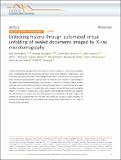Unlocking history through automated virtual unfolding of sealed documents imaged by X-ray microtomography
Author(s)
Dambrogio, Jana L.; Ghassaei, Amanda; Starza Smith, Daniel; Jackson, Holly; Demaine, Martin L.; Davis, Graham; Ahrendt, Rebekah; Akkerman, Nadine; van der Linden, David; Demaine, Erik D.; ... Show more Show less
Downloads41467-021-21326-w.pdf (4.504Mb)
Publisher with Creative Commons License
Publisher with Creative Commons License
Creative Commons Attribution
Terms of use
Metadata
Show full item recordAbstract
Computational flattening algorithms have been successfully applied to X-ray microtomography scans of damaged historical documents, but have so far been limited to scrolls, books, and documents with one or two folds. The challenge tackled here is to reconstruct the intricate folds, tucks, and slits of unopened letters secured shut with “letterlocking,” a practice—systematized in this paper—which underpinned global communications security for centuries before modern envelopes. We present a fully automatic computational approach for reconstructing and virtually unfolding volumetric scans of a locked letter with complex internal folding, producing legible images of the letter’s contents and crease pattern while preserving letterlocking evidence. We demonstrate our method on four letterpackets from Renaissance Europe, reading the contents of one unopened letter for the first time. Using the results of virtual unfolding, we situate our findings within a novel letterlocking categorization chart based on our study of 250,000 historical letters.
Date issued
2021-03Department
Massachusetts Institute of Technology. LibrariesJournal
Nature Communications
Publisher
Springer
Citation
Dambrogio, Jana et al. "Unlocking history through automated virtual unfolding of sealed documents imaged by X-ray microtomography." Nature Communications 12 (March 2021): 1184. © 2021 The Author(s)
Version: Final published version
ISSN
2041-1723